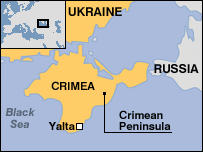A year after the Russian annexation of Crimea on Feb. 28, 2014, Crimean Tatars are still facing human rights abuses by Russian authorities. As the mistreatment of the defenseless minority has incessantly continued, the Crimean Turks Culture and Solidarity Association organized demonstrations on Saturday to protest Russian annexation of Crimea.
A Muslim community that comprises about 13 percent of the province's population, the Crimean Tatars were opposed to Moscow's takeover from Ukraine. They boycotted en masse the hastily-organized March referendum in which the pro-Russian majority voted to join Russia.
Native to the peninsula, the Crimean Tatars were brutally deported to Central Asia in 1944 by Joseph Stalin for alleged collaboration with the invading Nazis during World War II.
The return of Russian rule has triggered anxiety.
"After the Russian authorities came to Crimea, things that had never happened in Crimea before started to happen," Mejlis member Ilmi Umerov told to the AFP, a longtime head of the Bakhchysaray district who quit when it moved under Moscow's control.
"These actions are meant to teach us loyalty to these authorities."
Umerov said four young men remain missing after suspected kidnappings and that four others who disappeared were later found dead.
Living in Fear
The Crimean Tatars have largely opposed the annexation of Crimea by Russia, fearing a repeat of the events of 1944 when they were completely expelled as part of former Soviet dictator Josef Stalin's policy.
They gradually started returning in the early 1990s after the fall of the Soviet Union, but still live as a minority in their homeland as they were displaced by ethnic Russian settlers who migrated there later on.
Since the annexation, Russia has been granting Russian citizenship to the people of Crimea in replacement of their Ukrainian nationality. Crimean Tatars, who have campaigned to reject Russian citizenship, reserve the right to remain as Ukrainian citizens, but will by default become foreigners in their homeland.
"In every Crimean Tatar family there is a feeling of fear and lack of security while living in our own homeland," says Elvira Ablyalimova, listing "disappearances, sadistic murders... attacks on media, and arrests on trumped-up charges."
Her own husband, Akhtem Chiygoz, deputy head of the Tatar assembly, the Mejlis, was arrested for allegedly organizing riots, inciting violence and committing involuntary manslaughter. These charges are only part of a sweeping probe that has already seen over 150 people questioned and saw Ablyalimova's family home raided in January.
The probe against Chiygoz stems from a rally the Mejlis called on February 26 last year near the Crimean parliament, just hours before heavily armed soldiers in unmarked uniforms occupied the building, raised the Russian flag and forced the lawmakers to vote for installing a new pro-Russian government.
Clashes broke out when pro-Russian activists turned up at the same location. Footage shows two groups facing off, ignoring calls for order, yelling "Referendum!" or "Crimea is not Russia!" In the ensuing disorder, two people died.
However, the probe only targets Crimean Tatars and applies Russian law to events that preceded Russia's jurisdiction, Ablyalimova said. "It was a different reality, a different state," she said incredulously, calling the case illegal.
The authorities say that arrests and searches are well-founded and directed against political troublemakers rather than Crimean Tatars as a whole.
Media targeted
The office of the Mejlis has been sealed off and key members banned from entering Crimea, making Skype the only means to discuss important issues, said Umerov. The Tatar media also faces difficult times.
"Most of us are shocked by what happened in Crimea. Those who could not get over the shock have left," said Liliya Budzhurova, deputy director of the Crimean Tatar television channel ATR and also a reporter for AFP.
Those who stayed "made a difficult choice", she said, to live in what is essentially a hostile environment in which the channel must employ self-censorship if it wants to survive.
Last month ATR's premises were stormed by 50 Russian police who searched every workstation and employee and seized footage of the February 26 events, she said, calling the force used during the raid "intimidation".
The channel was openly pro-Ukrainian before, but recent Russian anti-extremism and separatism legislation has forced it to cut potentially compromising terminology from coverage, she said. They even avoid mentioning that Crimea was until a year ago part of Ukraine.
She described the process as having "scissors inside our heads".
"Occupation, annexation: these terms have been fully excluded from our vocabulary," she said.
The prospects for ATR look dismal. The new governor of Crimea, Sergei Aksyonov, said this month that the peninsula does not need "enemy media."
But closing down the world's only Crimean Tatar-language channel would be a global scandal and go against everyone's interests, Budzhurova said.
"For half a century we didn't have the right to speak, listen and read in our national language and to rob us of that right would be a repeat tragedy," she said, vowing to stay and work in Crimea no matter what.
"I cannot breathe here, but I will not leave, because it is my homeland," she said. "I will not leave, even if they blow up a nuclear bomb."
PHOTO CAPTION
Map locating Cremea
Source: Worldbulletin


 Home
Home Discover Islam
Discover Islam Quran Recitations
Quran Recitations Lectures
Lectures
 Fatwa
Fatwa Articles
Articles Fiqh
Fiqh E-Books
E-Books Boys & Girls
Boys & Girls  Hajj Rulings
Hajj Rulings Hajj Fatwas
Hajj Fatwas














